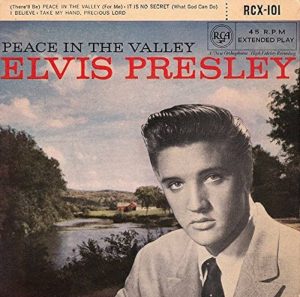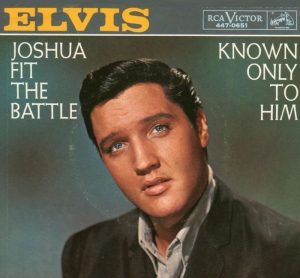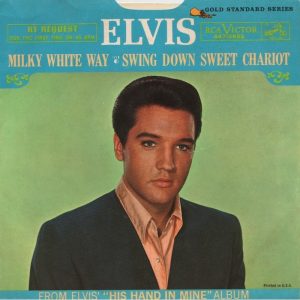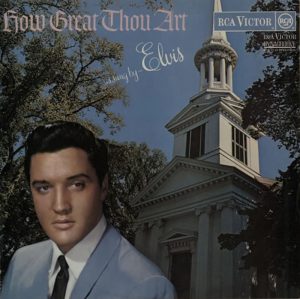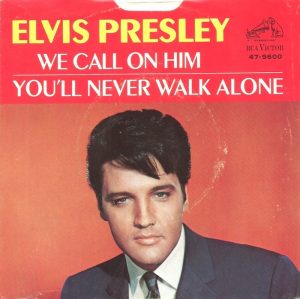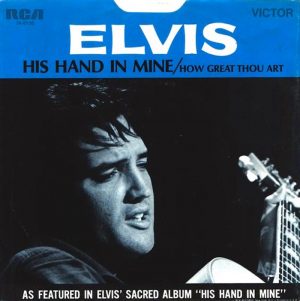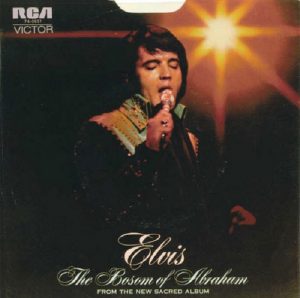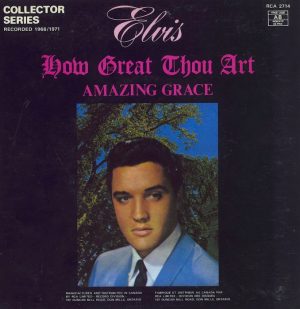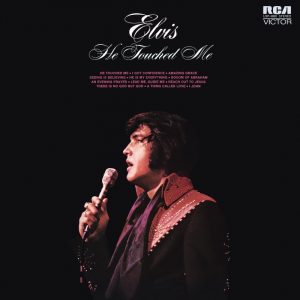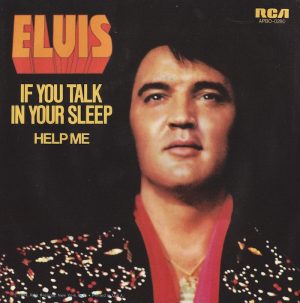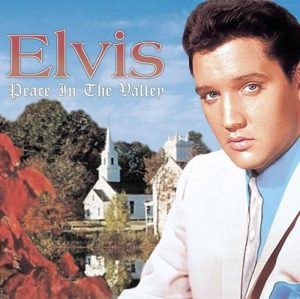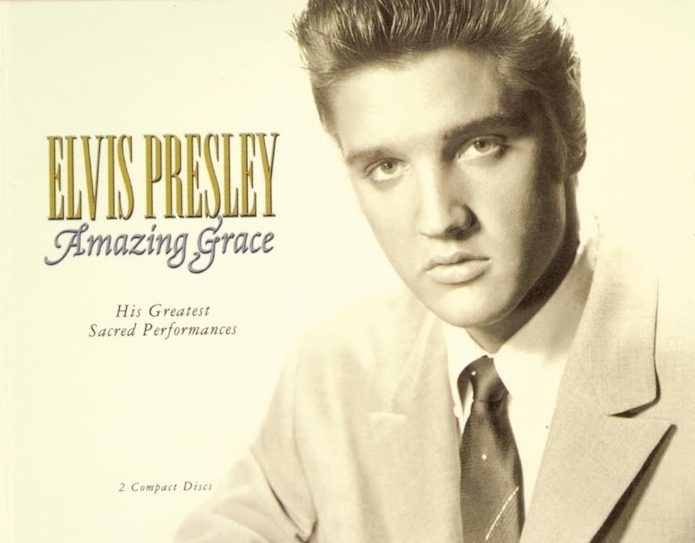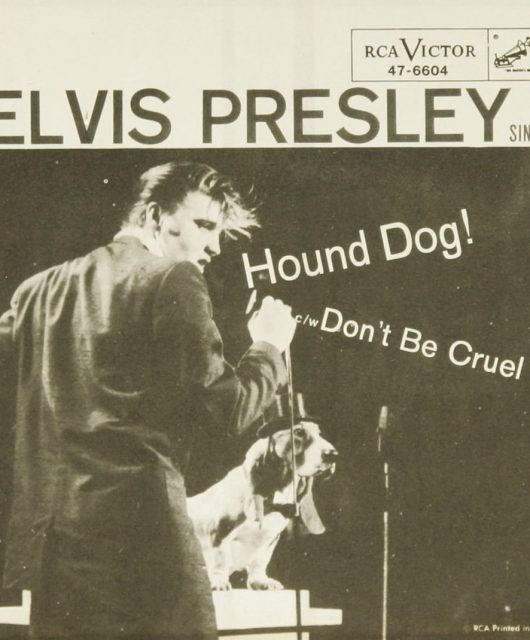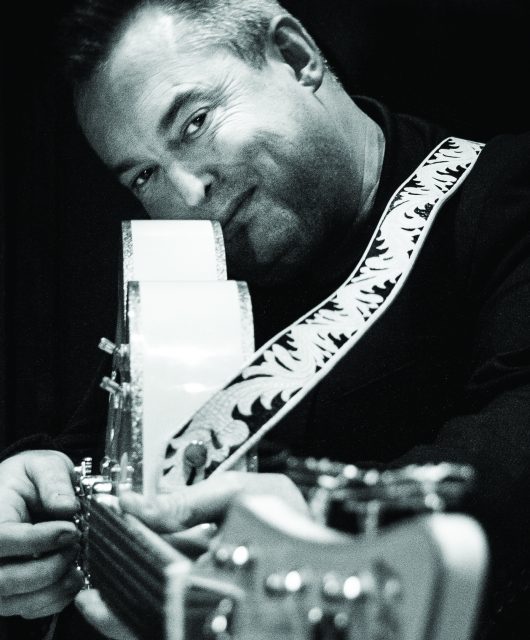As the King struggled with his personal demons, he often returned to his religious roots for both solace and musical inspiration – Vintage Rock tells the story of Elvis’ gospel music in his later years…
Words by Randy Fox
The music of the church continued as a major influence even as Elvis Presley discovered a love for country, pop and R&B. During the 50s, Memphis was a frequent stop for touring gospel quartets, both black and white. Elvis became a fan of “commercial” gospel music, regularly attending the “All-Night Singings” held at Memphis’ Ellis Auditorium where sharp-dressed performers thrilled audiences.
Although gospel music centered on the glory of God, it was frequently a much more dynamic style than the world of white pop or country music. As Elvis later recalled: “There were these singers, perfectly fine singers, but nobody responded to them. Then there were these preachers. They cut up all over the place, jumpin’ on the piano, movin’ every which way. The audience liked ’em. I guess I learned from them.”
Elvis’ love of gospel first manifested on his recordings with the release of his 1957 four-song EP, Peace In The Valley. In 1960, he released his first full gospel album, His Hand In Mine. Focusing on traditional hymns and gospel quartets, the album was successful both critically and financially, and played a part in the Colonel’s plan to reshape Elvis’ image from rock’n’roller to all-round family-friendly entertainer.
In April 1964, Elvis met Larry Geller, a 24-year-old hairdresser. Geller was an amateur student of Eastern and new age philosophies. Elvis became fascinated with Geller’s knowledge of spiritual concepts, and Geller eventually joined Elvis’ entourage, despite the objections of many of Elvis’ longtime friends.
Christian Beliefs
Although Elvis’ concept of spirituality expanded through the study of many Eastern philosophies, he remained dedicated to the core Christian beliefs he learned as a child. By 1966, he was eager to record another album of spirituals. Released in February 1967, How Great Thou Art, was a huge critical and financial success resulting in Elvis’ first Grammy Award (for “Best Sacred Performance”). That success led to the occasional addition of gospel numbers to his otherwise secular sessions. In his May 1970 sessions that produced the Elvis Country LP, he cut the Paul Radar hymn, Only Believe, released as the B-side of the quasi-spiritual/cosmic opus, Life.
By 1971, Elvis was ready to record his third gospel album. Just as his spiritual beliefs had expanded to include many non-Christian elements, his taste in gospel music had widened to include many non-traditional styles. He was fascinated with the new pop-styled “praise songs” that were gaining popularity among gospel fans and the California-based “Jesus music” that fused folk-rock with spirituality.
Sacred Success
After the success of Elvis’ May 1970 Nashville sessions where he recorded 34 masters in four days, RCA once again planned a marathon series of sessions. The goal was to record a minimum of 40 songs, enough material for three albums – pop, gospel and Christmas – along with several singles. Producer Felton Jarvis recruited the same musicians from the May 1970 sessions: James Burton (lead guitar), Chip Young (rhythm guitar), Norbert Putnam (bass), Jerry Carrigan (drums), David Briggs (piano), and Charlie McCoy (harmonica), along with the usual contingent of Nashville back-up singers. Jarvis wanted to duplicate the previous year’s sessions as closely as possible.
The plan went awry when Elvis arrived at RCA Studio B in Nashville on 15 March 1971 with a runny nose and aching eyes. Despite his obvious illness, he recorded four songs that night, including Amazing Grace. The first take featured Elvis and the band delivering a bluesy take on the hymn. For the second take, Jarvis reeled in Elvis and the band for a more conventional arrangement that eventually appeared on the He Touched Me album.
Throughout the evening, Elvis was clearly in pain, and the next morning he checked himself into a Nashville hospital for what was eventually diagnosed as secondary glaucoma. Elvis was discharged a few days later and returned to Memphis. The sessions were rescheduled for May.
The Imperials Phase
On 15 May 1971 Elvis returned to Studio B for a planned seven nights of recording. The same group of musicians from the March session was on hand, along with the addition of the gospel group, the Imperials. Nashville drummer Kenny Buttrey also joined the sessions on the second evening after Jerry Carrigan overslept and missed the start of that night’s recording. Elvis had recovered from his illness, but the musicians and back-up singers noticed a definite change in his demeanour. At the successful May 1970 sessions, Elvis was focused on the job at hand, giving his all on songs that inspired him and bringing a high level of professionalism, elevating the second rate material.
Elvis now seemed impatient and uninterested in recording. Rather than focusing on the music and working with the musicians to spark creativity, he was easily distracted. While a certain amount of horsing around was standard at Elvis’ recording sessions as a way to break the ice, the long stories, jokes, karate demonstrations and showing off the different firearms Elvis brought to the studio were now his main concern. Although few knew it at the time, Elvis’ use of amphetamines and other prescription drugs were clearly taking their toll.
Despite these issues, Jarvis wrangled Elvis into focusing on the task at hand. After knocking out the Christmas album in the first two nights of sessions, the group turned their attention to the more challenging task of the pop and gospel material. On the third night, Elvis cut the first true gospel song of the session, Lead Me, Guide Me, written and originally recorded by black gospel singer and songwriter Doris Akers in 1952. The session came to an abrupt end with an incident that seemed to exemplify the session so far.
Rock’n’Roll Gospels
A member of the backing group the Imperials asked Elvis how he would disarm an attacker. Forgetting about the music, Presley told his bodyguard, Red West, to pretend like he was trying to rob him. After removing the bullets from his gun, West pointed the pistol at Elvis. With a roundhouse kick, Elvis sent the gun flying across the studio and directly through the back of guitar player Chip Young’s custom-built acoustic guitar which was leaning against a wall. Elvis immediately apologised and offered to pay for the instrument, but Young downplayed the incident as he recalled in a 2010 interview with Bill Lloyd.
“I thought about it for a second,” Young said. “I held it up and said, ‘Actually this guitar is probably worth a lot more money now than it was before.’”
With that settled, Elvis moved on to other distractions, ending work for the evening, but several of the musicians remained anxious over Elvis’ continuing fascination with guns in the studio.
Over the next four nights, Elvis finished 14 masters, including four for the gospel album. Although Elvis remained generally distracted, the gospel songs brought his musical instincts into focus. The gospel standard, An Evening Prayer, was given a sparse, traditional treatment, emphasised by David Briggs’ church-styled piano flourishes and the Imperials’ choral backing.
Seeing Is Believing
The gospel classic, He Touched Me, also received a traditional treatment as Elvis provided the solo lead, backed by the Imperials. Written by gospel singer and songwriter Bill Gaither in 1963, He Touched Me was a familiar tune for the Imperials, having recorded it in 1965 and in 1969. The latter was one of Elvis’ favourite gospel recordings and he based his version closely upon it.
One of the best cuts from the sessions came from contemporary African-American gospel composer Andrae Couch. I’ve Got Confidence was an instant soul gospel classic and Elvis and the band were inspired by the driving rhythm of the song’s chorus, and they delivered a first-class performance. The high energy continued on Seeing Is Believing, a song co-written by Elvis’ friend Red West and songwriter/music arranger Glen Spreen.
Featuring an exciting electric guitar lead from James Burton, the soaring gospel number was an early example of the burgeoning genre Christian Rock.
While not strictly a gospel song, the Jerry Reed composition, A Thing Called Love, was eventually included on the He Touched Me album. Originally recorded by Reed for his 1968 Nashville Underground LP, the song became a No.21 country hit for singer Jimmy Dean the same year. Elvis’ version features a complex vocal arrangement, spotlighting a harmony duet between Elvis and bass singer Armond Morales of the Imperials.
Spiritual Sessions
With the gospel album incomplete after a week of sessions, Jarvis booked three more nights at Studio B for 8-10 June. The same group of musicians returned, and Elvis was in a much better mood the first night. Although gospel was the main focus of the session, Elvis wanted another shot at the Buffy Saint-Marie song, Until It’s Time For You To Go. Elvis cut the song at the May sessions but was not satisfied. After capturing a take that Elvis was pleased with, the group moved on to the gospel pop song, Put Your Hand In The Hand.
Written by Canadian songwriter Gene MacLellan and originally recorded by Anne Murray, the tune was a perfect example of the feel-good “praise songs” that were gaining popularity with mainstream churches.
The Canadian pop group Ocean also covered the song and their version hit No.2 on the US Billboard Hot 100 just months before Elvis recorded his version, which eventually appeared on the 1972 LP, Elvis Now.
A new song by California composer and arranger Ralph Carmichael, Reach Out To Jesus, was the final song of the evening. Elvis delivered a powerful and sincere performance reminiscent of the type that made his first two gospel albums classics. Although the first night’s session ended at the rather early hour (for Elvis) of 2am, his mood and focus remained consistently high…
Musical Gift
Sadly, the impatience of his earlier sessions returned on the second night. He managed to focus for a conventional and emotional take of Dallas Frazier’s song He Is My Everything, but his lack of interest clearly showed on the next song.
Writ No God But God, clearly paled beside the other material recorded for the album. Elvis delivered a lightweight poppy take on the song, displaying little of the creativity of Elvis’ best recordings.
Elvis’ greatest musical gift was his almost ability to transmute the songs of others into recordings that were thoroughly his own. The tendency to just copy previous versions of songs or barely develop a new song beyond the arrangement of its demo recording became frequent occurrences at his sessions as the 1970s progressed.
Rock My Soul
With no more new gospel material on hand, Elvis turned to two old favourites which served to focus his interest. I, John was based on a black spiritual (usually titled John Saw A Mighty Number) that had been recorded by many artists since its origins in the African American jubilee gospel movement of the late 19th century. Bosom Of Abraham had a similar origin and history (under the more common title, Rock My Soul).
For Elvis’ recordings, both songs were credited to William Johnson, George McFadden and Ted Brooks, three of the four members of the black gospel quartet The Jubilee Four who had appeared in Elvis’ 1964 film Viva Las Vegas.
Both songs appeared on the Jubilee Four’s 1961 album, Lookin’ Up – Negro Spirituals. For his versions of the songs, Elvis utilised the talents of the Imperials to give the two songs the full gospel quartet treatment with bass singer Armond Morales sharing the lead with Elvis. With the gospel album completed, Elvis moved on to other material for the third night of recording.
Touched By God
Released in April 1972, right before the Easter holiday, the album He Touched Me received positive reviews.
Billboard magazine singled out the title track, I’ve Got Confidence, Amazing Grace and Bosom Of Abraham as potential radio hits. Rolling Stone magazine gave the album its highest five star rating. Despite the positive reviews, sales failed to measure up to Elvis’ earlier gospel LP.
He Touched Me rose to No.79 on the Billboard 200 Top Albums chart, far short of the top 20 positions attained by his previous gospel LPs. The single from the album, He Touched Me backed with Bosom Of Abraham failed to chart. Although He Touched Me fell short on sales, it garnered Elvis his second Grammy, winning for “Best Inspirational Performance” at the 1973 Grammy awards ceremony.
Bright Lights Of Sin City
Although the Imperials had been backing Elvis since his return to live performing in 1969, many of their gospel fans disapproved of performing in the “Sin City” of Las Vegas.
As their gospel bookings declined, the Imperials began touring with country star Jimmy Dean. By September 1971, scheduling conflicts between the Imperials’ work with Elvis and Dean led to the group signing exclusively with Dean.
Elvis planned to return to nationwide touring and required another gospel quartet to back him. Elvis’ friend Charlie Hodge suggested checking with Elvis’ old friend JD Sumner. A former member of two of Elvis’ favourite gospel groups, the Sunshine Boys and the Blackwood Brothers Quartet, Sumner had retired from singing but managed the Stamps Quartet. He sent Elvis a copy of the group’s most recent album. After listening to the record repeatedly, Elvis called Sumner to tell him the group was hired.
When Sumner and the Stamps joined Elvis’ tour in November 1971, Elvis was surprised that Sumner had no plans to perform. After some pleading, Sumner agreed to return to singing, and with a slight name change, JD Sumner and The Stamps Quartet backed Elvis on tour and opened most of his live shows for the next six years.
How Great Thou Art
Both live and in the studio, JD Sumner and the Stamps primarily performed on secular numbers. The only two studio gospel recordings they made with Elvis were at the December 1973 sessions held at Stax Records’ studio in Memphis.
Help Me was a country gospel song written by up-and-coming country singer Larry Gatlin. During the recording, Elvis was so consumed by the song’s moving lyrics that he dropped to his knees for the final verse. Released as the B-side of If You Talk In Your Sleep, Help Me rose to No.6 on the country singles chart in the summer of 1974. The song became one of Elvis’ favourites and he frequently performed it in concert.
If That Isn’t Love was a contemporary gospel number written by Dottie Rambo and originally recorded by the gospel harmony trio the Rambos in 1969. Elvis’ version first appeared on the 1974 LP Good Times.
On 20 March 1974, RCA recorded Elvis in concert at the Mid-Coliseum in Memphis. Released on 7 July 1974, the album, Elvis Recorded Live On Stage In Memphis, included a version of Help Me, along with a grandiose live rendition of How Great Thou Art as well as a featured a performance of the Kris Kristofferson gospel number Why Me Lord? by JD Sumner and the Stamps.
Although the album only reached No.33 on the Billboard Top 200 Albums chart, the recording of How Great Thou Art received a Grammy for “Best Inspirational Performance,” the third and final Grammy Elvis received during his life. Other live versions of How Great Thou Art appeared on the 1977 live album Elvis In Concert (1977) and the posthumous Elvis Aron Presley (1980).
Lifelong Passion
Although the gospel recordings of Elvis with JD Sumner and the Stamps are few, perhaps the finest was on film in the 1972 concert documentary, Elvis On Tour. Elvis preferred warming up before shows with impromptu jam sessions of gospel numbers. He frequently called the Stamps into his dressing room for informal singing sessions, singing harmony rather than the lead.
On 31 March 1972, Elvis, his road band and the Stamps held rehearsals in RCA’s Studio C in Hollywood, California for an upcoming nationwide tour. A film crew shot footage for the documentary. During a break in the formal rehearsals, the film crew captured Elvis, the Stamps and assorted musicians gathered around the piano. In a jam session reminiscent of the Million Dollar Quartet, Elvis and the assembled group informally worked their way through a variety of numbers including I, John; Bosom Of Abraham; You Better Run; Lead Me, Guide Me and a medley of Amazing Grace, Turn Your Eyes Upon Jesus and Nearer My God To Thee. In 1994, the audio from this portion of the documentary was released on the compilation CD, Amazing Grace – His Greatest Gospel Performances.
Elvis’ love for gospel music was a lifelong passion and influence upon every other style of music he pursued. It was a well of inspiration that he turned to again and again and a vital component of uniquely “Elvis” recordings.
Check out Memphis Recording Service here
Want more Elvis? Read our Return Of The King – The Fall And Rise Of Elvis Presley feature


